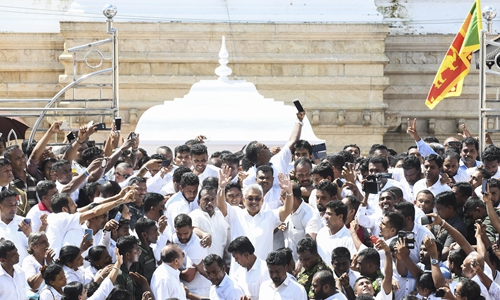HOME >> WORLD
Sri Lanka president sworn in
By Global Times – Agencies Source:Global Times Published: 2019/11/18 20:13:39
Rajapaksa pledges to combat extremism, work for all

Sri Lanka's President-elect Gotabaya Rajapaksa (C) takes the oath of office during his swearing-in ceremony at the Ruwanwelisaya temple in Anuradhapura on Monday. Rajapaksa was revered by his supporters, following an election victory in which he secured more than 6.9 million votes. Photo: AFP
Sri Lanka's new president Gotabaya Rajapaksa was sworn in Monday at a Buddhist temple revered by his supporters, following an election victory.
Geng Shuang, spokesperson of China's Foreign Ministry told a regular media briefing on Monday that China is pleased to see that Sri Lanka has successfully held elections and completed a major part of its domestic political agenda.
Geng expressed heartfelt congratulations to Rajapaksa on his election as the country's new president. He pointed out China and Sri Lanka share a strategic cooperative partnership. On the basis of mutual respect, equality and mutual benefit, China is willing to work with Sri Lanka's new leaders and government to co-build the Belt and Road Initiative with high quality and advance bilateral relations to bring tangible benefits to people of both countries, Geng said.
Rajapaksa was once the country's defense secretary. He took the oath of office at an ancient temple at Anuradhapura. In his brief acceptance speech at the announcement of the final election results on Sunday, Rajapaksa pledged to work for all Sri Lankans.
"I am very happy that I have won. I am ready to take over and begin work for all my citizens," Rajapaksa told Xinhua after meeting Elections Chief Mahinda Deshapriya in the capital of Colombo.
Deshapriya congratulated Rajapaksa and officially declared him the winner at the Election Commission on Sunday. Rajapaksa contested the election held on Saturday from the opposition Sri Lanka Podujana Peramuna (SLPP) after his party declared him as the most popular candidate of the SLPP.
According to final results, Rajapaksa won the polls after securing over 6.9 million votes, or 52 percent of the total votes, defeating his opponent, Sajith Premadasa.
Rajapaksa formally announced his candidacy just days after Islamist attacks on April 21 that killed 269 people, promising to protect the nation.
Rajapakasa insisted extremists would not have carried out any attacks if he had been in power. He blamed the government of Prime Minister Ranil Wickremesinghe for weakening the intelligence apparatus he had built, AFP reported.
RELATED ARTICLES:
Posted in: ASIA-PACIFIC